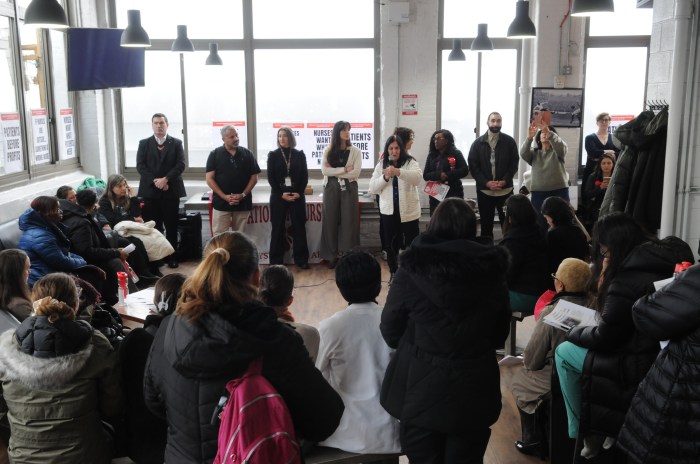About 1,000 union nurses at NYU Langone Hospital-Brooklyn are prepared to go on strike on March 1 unless a deal can be struck before their contract expires at midnight on Feb. 28.
The Federation of Nurses/UFT, which represents the nurses, issued a ten-day strike notice last week in the midst of contentious contract negotiations. The union is demanding an end to “chronic understaffing” and higher wages, and said the hospital has so far been unwilling to meet those demands.
“It is the nurses who are advocating for what patients need — the correct number of nurses, properly trained, with the right equipment,” said Anne Goldman, head of the Federation of Nurses/UFT, in a statement. “That is what we are demanding in our contract. It is time for NYU Langone to put patients before profits.”
NYU Langone-Brooklyn has violated union staffing requirements set by the union contract and by state law thousands of times in the past three years, the group said.

In December 2023, an independent arbitrator confirmed that the hospital had repeatedly violated nurse-to-patient ratios in its medical-surgical unit, and at least two other short-staffing complaints were being arbitrated at the time.
Yusif Rahman, an RN who has worked in NYU Langone-Brooklyn’s surgical intensive care unit for four years, said the hospital – like the union – knew the contract was set to expire this month, and should have been ready for negotiations.
“There’s no reason why they can’t be prepared to provide competitive salaries and the correct support for our nurses,” he told Brooklyn Paper.
Typically, the 14-bed surgical ICU has seven nurses — a ratio of two patients per nurse, Rahman said.
In the unit, nurses are responsible for helping patients move around, bringing patients to the bathroom, turning them frequently to prevent bed sores, and administering medications, Rahman said.
When the unit is understaffed, they can’t respond to patient calls as quickly, which might mean patients are waiting to be brought to the bathroom or for their pain medications.
NYU Langone Hospital-Brooklyn is the only hospital in the borough to have received a Magnet designation from the American Nurses Credentialing Center. That makes the alleged mistreatment of nurses even worse, said Rebecca Morogiello, an RN and case manager at the hospital, in a statement.
“That is a huge accomplishment. That is not an accomplishment of NYU, that is an accomplishment of the Federation of Nurses/UFT who work inside that hospital,” Morogiello said. “The support that we offer them is the reason why that magnet designation is there.”
While nurses’ exact salaries are private, Rahman said there is a significant gap between pay offered at NYU Langone-Brooklyn and other hospitals in the area. He lives in Brooklyn, and said paying his living expenses can be challenging on his current salary.
“With many health costs, even something as simple as eggs, everything is inflated, rent has gone up, utilities have gone up, it is absolutely difficult to live with the salary we are provided with,” he said.

Michael Mulgrew, UFT president, said in a statement that NYU-Langone “doesn’t care” about day-to-day operations at the hospital.
“If they did, they wouldn’t be putting patients at risk and burning out nurses with chronic understaffing,” he said. “Peel back NYU’s pretty purple veneer, and the reality is not so pretty. That’s why we are standing with the Federation of Nurses/UFT.”
The strike could be avoided if a contract is agreed upon before midnight on Friday. Since 2023, strikes have been narrowly avoided at several local hospitals, including Maimonides Medical Center and NewYork-Presbyterian Brooklyn Methodist Hospital.
“NYU Langone remains committed to bargaining in good faith and is optimistic that we will reach an agreement that supports our nurses and NYU Langone Hospital-Brooklyn’s mission to provide exceptional outcomes to all of our patients,” said NYU spokesperson James Iorio, in an email.
Rahman said the prospective strike is stressful, but necessary.
“It is overwhelming, however, we are fighting tremendously hard to get a fair contract for our nurses,” he said. “We do not want to strike, but the option is there and we will use it if we don’t get a fair contract with safe staffing and adequate pay.”




